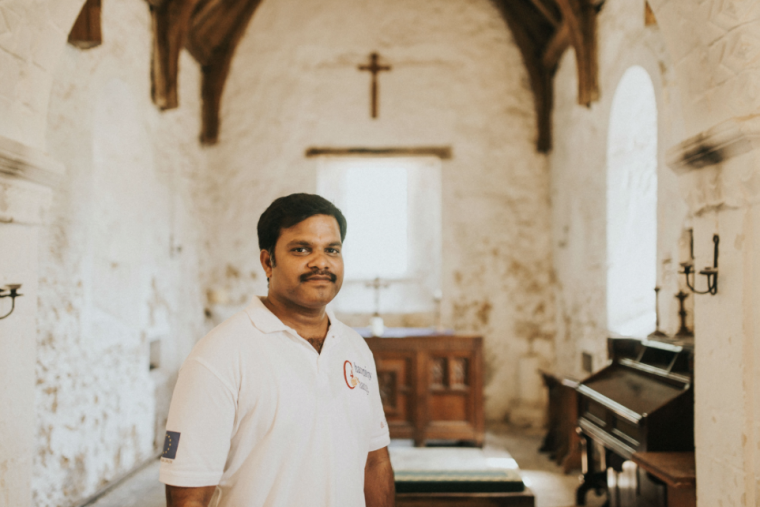Leprosy survivor from India makes pilgrimage to Cambridge's 12th century Leper Chapel

An extraordinary encounter in Cambridge has seen a visitor from India bridge the 12th and the 21st centuries across 900 years of history.
Ganesh Muthusamy, 32, was diagnosed and treated for leprosy while still at school, by which time he had already lost sensation in his right foot which developed ulcers and became badly damaged. Through corrective surgery and protective footwear from a Leprosy Mission Hospital in India he is now able to walk again.
Ganesh is known as a 'leprosy champion' in India where the ancient stigma surrounding leprosy is still rife. And yesterday he visited Cambridge's 12th-century Leper Chapel, the oldest complete building in the city, erected to care for English people with leprosy nearly 900 years ago.
Prof Helen Weinstein of Clare Hall, Cambridge, told an audience from the local community at the Leper Chapel that there was a high number of leprosy cases in Cambridge in the Middle Ages.
While people affected by leprosy in Cambridge had to wear special outfits and even shout out 'unclean' to warn people to stay clear, there was kindness and compassion for people affected by leprosy, she said. The hospital and chapel were funded by philanthropists through the nearby Barnwell Priory with monks ministering to patients at the chapel.
Ganesh said his visit to the Leper Chapel was like 'coming home'.
'I'm very happy to be here because people who had leprosy in England prayed in this building for people like me,' he said.
And now I'm praying for the next generation to not be disabled by leprosy. Being here feels very emotional and almost like coming home.'
Ganesh travelled to the UK to attend the Global Disability Summit hosted at Olympic Park on Tuesday. While leprosy is a disease of the past in the UK with our last indigenous case diagnosed in 1798, the disease is a 21st-century problem globally with a quarter of a million cases diagnosed each year, more than half of which are in India.
Ganesh said: 'When I was first diagnosed with leprosy I was worried people would isolate me. I did not tell anyone that I was diagnosed, except my family, because of the fear surrounding the disease. So I guess that's self-stigma as well.
'One member of my family did, in fact, want me to leave the family but thankfully is ok with the situation now.
'I find it hard to work because I can't stand or walk for long because, although I have had reconstructive surgery to correct foot drop, leprosy has left me with a numb right foot.
'It is difficult for people with a disability to work in India but people affected by leprosy would not be included in the disability group – they segregate us.
'You see this in India which still has 850 leprosy colonies – inclusion isn't happening which is affecting our fundamental rights.
"I'm still not finding a proper job when leprosy is a curable disease that anyone can get in India. People need to know about it as if it is treated early then they will not develop disabilities.'
Ganesh is one of 500 'leprosy champions' in India reaching out to 10,000 people affected by leprosy and disabilities as part of international Christian charity The Leprosy Mission's CREATE project, which seeks justice for people mistreated because of leprosy. The European Union has given more than £1m to support the project.
Source: Christian Today
 Christians don't have to affirm transgenderism, but they can’t express that view at work: tribunal
Christians don't have to affirm transgenderism, but they can’t express that view at work: tribunal Archaeology discovery: Medieval Christian prayer beads found on Holy Island
Archaeology discovery: Medieval Christian prayer beads found on Holy Island Presbyterian Church in America votes to leave National Association of Evangelicals
Presbyterian Church in America votes to leave National Association of Evangelicals Over 50 killed in 'vile and satanic' attack at Nigerian church on Pentecost Sunday
Over 50 killed in 'vile and satanic' attack at Nigerian church on Pentecost Sunday Ukrainian Orthodox Church severs ties with Moscow over Patriarch Kirill's support for Putin's war
Ukrainian Orthodox Church severs ties with Moscow over Patriarch Kirill's support for Putin's war Islamic State kills 20 Nigerian Christians as revenge for US airstrike
Islamic State kills 20 Nigerian Christians as revenge for US airstrike Man who served 33 years in prison for murder leads inmates to Christ
Man who served 33 years in prison for murder leads inmates to Christ


 Nigerian student beaten to death, body burned over ‘blasphemous’ WhatsApp message
Nigerian student beaten to death, body burned over ‘blasphemous’ WhatsApp message 'A new low': World reacts after Hong Kong arrests 90-year-old Cardinal Joseph Zen
'A new low': World reacts after Hong Kong arrests 90-year-old Cardinal Joseph Zen Iran sentences Christian man to 10 years in prison for hosting house church worship gathering
Iran sentences Christian man to 10 years in prison for hosting house church worship gathering French Guyana: Pastor shot dead, church set on fire after meeting delegation of Evangelicals
French Guyana: Pastor shot dead, church set on fire after meeting delegation of Evangelicals ‘Talking Jesus’ report finds only 6% of UK adults identify as practicing Christians
‘Talking Jesus’ report finds only 6% of UK adults identify as practicing Christians Mission Eurasia ministry center blown up in Ukraine, hundreds of Bibles destroyed: 'God will provide'
Mission Eurasia ministry center blown up in Ukraine, hundreds of Bibles destroyed: 'God will provide' Church holds service for first time after ISIS desecrated it 8 years ago
Church holds service for first time after ISIS desecrated it 8 years ago Burger King apologizes for 'offensive campaign' using Jesus' words at the Last Supper
Burger King apologizes for 'offensive campaign' using Jesus' words at the Last Supper Uganda: Muslims abduct teacher, burn him inside mosque for praying in Christ’s name
Uganda: Muslims abduct teacher, burn him inside mosque for praying in Christ’s name